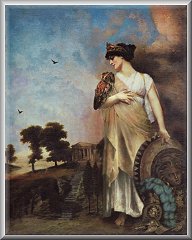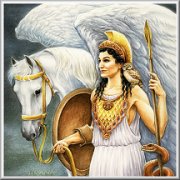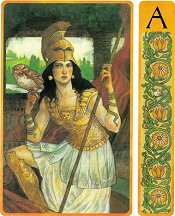
ATHENA
CLICK TO ENLARGE

ATHENA
CLICK TO ENLARGE

ATHENA
CLICK TO ENLARGE
|
ATHENA PAGE FOUR
continued from page three
Athena's father Zeus was the most powerful and influential of
the Olympian gods, and her mother Metis was the wisest. It can
hence be argued that Athena was a combination of the two, making
her a goddess in whom power and wisdom were harmoniously
blended.
This fundamental idea helps to explain the lofty regard in which
various ancient writers held Athena. They painted her as a deity
of a purely ethical character, rather than representative of any
particular physical power manifested in nature, such as storms
or volcanoes.
Athena's power and wisdom shine brightest in her role as the
protector and preserver of the State and of social institutions.
Endeavors such as agriculture, industry and inventions further gave the
state strength and prosperity, and thus were also under Athena's
stewardship.
She also was responsible for the protection and preservation of
the State; items such as the fortification and defense of city
walls, harbors and fortresses were under her immediate care.
As the protector of agriculture, Athena is represented as the
inventor of the plough and rake; she created the olive tree, the
greatest blessing of Attica; taught the people to yoke oxen to
the plough; took care of the breeding of horses; and instructed
men how to tame them by the bridle, which was her own invention.
At the beginning of spring in many places thanks were offered to her in advance
for the protection she was to afford to the fields.
Besides the inventions relating to agriculture, many others
connected with science, industry, and art, are
ascribed to her. None of her contributions were frivolous or
accidental, but rather the result of careful
thought and meditation.
Of particular note is the invention of numbers, of the trumpet, the
chariot, and the skill of navigation.
In regard to all kinds of useful arts, she was believed to have
made men acquainted with the means and instruments which are
necessary for practicing them, such as the art of producing
fire.
She was further believed to have invented nearly every kind of
work in which women in particular were employed, and she herself was
highly proficient
in such work, practicing what she preached.
In short Athena and the god of the smiths and forge, Hephaestus, were the great patrons both of
the useful and elegant arts. Hence she is called erganê
(or ergatis, the worker), and later writers make her
the goddess of all wisdom, knowledge and art, and represent her
as sitting on the right hand side of her father Zeus, the seat
of honor, and
supporting him with her sage counsel.
As the goddess who made so many inventions necessary and useful
in civilized life, she is characterized by various epithets and
surnames, expressing the keenness of her sight or the power of
her intellect, such as optiletis, ophthalmitis, oxuderkês,
glaukôpis, poluboulos, polumêtis, and mêchanitis.
These honorifics were bestowed upon Athena by the grateful and
adoring Greeks.
As the patron divinity of the state, she was at Athens the
protector of the houses which formed the basis of the state. She
also maintained the authority of the law, justice and
order, not only in the courts but also wherever people
congregated or assembled.
This notion was as ancient as the Homeric poems, in which Athena
is described, for example, as assisting Odysseus against the
lawless conduct of the suitors of his wife Penelope, bringing
divine justice and balance to his home that they had profaned.
Athena presided over the first court which tried a case of
homicide, the murder of Clytaemnestra by her son Orestes,
establishing a permanent tribunal in Athens. The goddess, who
generally prefers to see most things from a manly point of view,
acquitted Orestes, for she judged Clytaemnestra's crime, that of
killing her husband, to be greater than that of Orestes.
Thus was Athena believed to have instituted the ancient court of the Areiopagus,
where often the life of men and women lay in the balance, and in cases where the votes of the judges were
equally divided, she cast the deciding one in favor of the
accused. This helped solidify her reputation as Athena the
merciful.
ATHENA CONCLUDES ON PAGE
FIVE
LOTS MORE STORIES AND A TON OF PIX
CLICK HERE!

[home][page
one][page two][page
three][page four][page
five]
|







